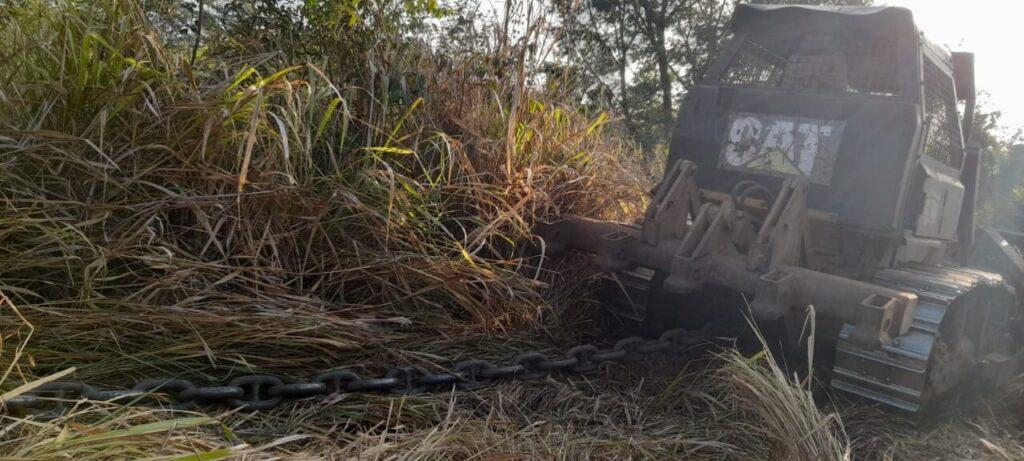Quilombola Communities Defend Territory Against Invasion in Brazil’s Cerrado
Grassroots International has heard from our grantee Movimento Quilombola no Maranhão (MOQUIBOM) about a Quilombola territory in Maranhão, Brazil, that’s been invaded by armed men. MOQUIBOM and the Guerreiras da Resistência/Women Warriors of MOQUIBOM were able to capture three of the tractors with massive chains that are used to deforest and rip up the Cerrado. This is taking place in the Tanque da Rodagem quilombo in the municipality of Matões. They are keeping watch and asking for all to spread the word so the perpetrators know that the world is watching. The following is a translation of an article posted on the Cerrado Campaign website on September 12, 2021.
Armed Men Invade Quilombola Territory On Saturday Night To Continue Deforestation In Maranhense Cerrado
On the night of Saturday, September 11, ten armed men invaded the quilombola territories of Tanque da Rodagem and São João in the municipality of Matões, East Maranhense, 300 km away from São Luís. The community, which was on watch, resisted. Quilombolas prevented the armed men, hired by two soybean growers from Paraná who threaten traditional life, from re-appropriating the tractors, which throughout the day deforested huge areas of the Cerrado. This took place in the area cultivated by the quilombolas to maintain their wellbeing.
What happens in Tanque da Rodagem is a tragedy. Since the early hours of Saturday (9/11), the Pastoral Land Commission in Maranhão (CPT-MA), which monitors the situation of the community, denounced to the police authorities the invasion and deforestation in the territory by the armed men, without any judicial order. The native vegetation, including trees and fruit species that sustain the territory, were destroyed throughout the day by tractor chain.
Denunciations of this invasion were widely aired on social networks by the National Campaign in Defense of the Cerrado, and on traditional television stations in Maranhão. The quilombolas closed down (the highway) MA 262 in protest against the situation. The CPT’s lawyer, Rafael Silva, warned that it is “necessary that the institutions of the State of Maranhão act to protect the Tanque da Rodagem community against environmental crimes and other types of crime that are taking place there.”
For Sebastião Ferreira, who has lived in the region for over 46 years, it is an absurd situation. “People arrive from the outside saying they are owners, with no respect for our history and our way of life. It is from here, for four decades, that I have earned my family’s livelihood,” he said.
Even so, the night brought even more threats and violence. The news as of dawn today is that both the quilombola community and the armed men are still in the territory of Tanque da Rodagem and São João and the block of MA 262 continues. More than 50 families live in the territory. Since 2013, they have been waiting for the land title regularization of the quilombola territory by Incra (the National Institute of Colonization and Agrarian Reform).
The use of pesticides is another threat to the community. In June of this year, residents of the quilombola community reported to the Maranhão Agroecology Network (RAMA) that they felt various symptoms such as itching and burning eyes, and that the planting of their beans and corn was compromised. These are the consequences of the use of pesticides by soy growers, which compromises the health of the people and the territory of the quilombolas.
Crime of Ecocide in the Cerrado of Maranhão denounced to the People’s Court
The aggression against the the Cerrado and the traditional way of life there was intensified on the same day that celebrates the National Cerrado Day (9/11) and also one day after the indictment of accusations involving ongoing crimes of ecocide and threats of cultural genocide accepted by the members of the jury of the Permanent Court in Defense of the Cerrado Territories (TPP).
Of the 15 cases presented to the TPP, three are from Maranhão: The first is the situation of the Cajueiro community, facing a private port project with foreign investment and supported by the Government of Maranhão, to transport agricultural commodities, which include products from agribusiness. The other two cases are from the Guerreiro and Cocalinho quilombos, in the municipality of Parnarama, neighboring the Tanque da Rodagem quilombo. The court will rule on crimes of ecocide against the Cerrado committed by states and companies.
The TPP is a popular court body that seeks to recognize, make visible and expand the voices of people who are victims of rights violations. The work of the TPP will continue until 2022. The sentences handed down by the TPP are extremely important for national and international justice systems, and for public opinion in general, as they expose the gaps and limits of the international system for the protection of human rights, and thus encourage its evolution.





